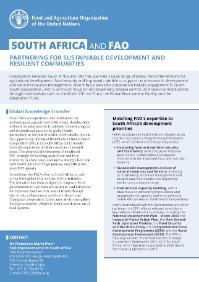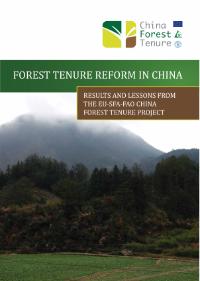Focal point
Location
The Food and Agriculture Organization of the United Nations leads international efforts to defeat hunger. Serving both developed and developing countries, FAO acts as a neutral forum where all nations meet as equals to negotiate agreements and debate policy. FAO is also a source of knowledge and information. We help developing countries and countries in transition modernize and improve agriculture, forestry and fisheries practices and ensure good nutrition for all. Since our founding in 1945, we have focused special attention on developing rural areas, home to 70 percent of the world's poor and hungry people.
Members:
Resources
Displaying 356 - 360 of 5074Perfil de País – Guatemala
Este perfil de país describe el estado de los recursos hídricos y el uso del agua, así como el estado de la gestión del agua agrícola en Guatemala. El objetivo de esta monografía es describir las particularidades del país y los problemas encontrados en el desarrollo de los recursos hídricos y el riego en particular.
South Africa and FAO
Cooperation between South Africa and FAO has spanned a large range of areas, from interventions for agricultural development, food security and improved nutrition to support rural economic development and natural resources management. Recent focus areas for cooperation include engagement in SouthSouth Cooperation, with a particular focus on transboundary disease control, and resource mobilization through mechanisms such as the Green Climate Fund, the Global Environment Facility and the Adaptation Fund.
Forest Tenure Reform in China
The China Forest Tenure Project was implemented by the State Forest Administration (SFA) and the Food and Agriculture Organization of the United Nations (FAO). An appreciation of the lessons learned from the project requires an understanding of the context in which it operated. For that purpose, a brief sketch of the history of tenure reform in China is presented here, followed by a discussion of the tenure process and background information on policy and regulatory constraints.
Review of forest owners’ organizations in selected Eastern European countries
Tendances du droit forestier en Afrique Francophone, Hispanophone et Lusophone
Dans le passé récent, et plus particulièrement au cours des quinze dernières années, presque tous les pays africains ont entrepris des réformes législatives en vue de se doter d'un cadre juridique − loi ou code forestier, nouveau ou rénové − relatif à la gestion des ressources forestières. Ces processus réformateurs ont suivi l’évolution des idées et des connaissances, des politiques et des réglementations, tant nationales qu'internationales, qui ont marqué le secteur forestier, en particulier, et l’environnement global en général.











